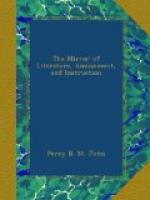* * * * *
LORD BYRON’S “LOVE.”
From Lady Blessington’s Conversations.
Of love he had strange notions: he said that most people had le besoin d’aimer, and that with this besoin the first person who fell in one’s way contented one. He maintained that those who possessed the most imagination, poets for example, were most likely to be constant in their attachments, as with the beau ideal in their heads, with which they identified the object of their attachment, they had nothing to desire, and viewed their mistresses through the brilliant medium of fancy, instead of the common one of the eyes. “A poet, therefore (said Byron), endows the person he loves with all the charms with which his mind is stored, and has no need of actual beauty to fill up the picture. Hence he should select a woman, who is rather good-looking than beautiful, leaving the latter for those who, having no imagination, require actual beauty to satisfy their tastes. And after all (said he), where is the actual beauty that can come up to the bright ‘imaginings’ of the poet? where can one see women that equal the visions, half mortal, half angelic, that people his fancy? Love, who is painted blind (an allegory that proves the uselessness of beauty), can supply all deficiencies with his aid; we can invest her whom we admire with all the attributes of loveliness, and though time may steal the roses from her cheek, and the lustre from her eye, still the original beau ideal remains, filling the mind and intoxicating the soul with the overpowering presence of loveliness. I flatter myself that my Leila, Zuleika, Gulnare, Medora, and Haidee will always vouch for my taste in beauty: these are the bright creations of my fancy, with rounded forms, and delicacy of limbs, nearly so incompatible as to be rarely if ever united; for where, with some rare exceptions, do we see roundness of contour accompanied by lightness, and those fairy hands and feet that are at once the type of beauty and refinement. I like to shut myself up, close my eyes, and fancy one of the creatures of my imagination, with taper and rose-tipped fingers, playing with my hair, touching my cheek, or resting its little snowy-dimpled hand on mine. I like to fancy the fairy foot, round and pulpy, but small to diminutiveness, peeping from beneath the drapery that half conceals it, or moving in the mazes of the dance. I detest thin women; and unfortunately all, or nearly all plump women, have clumsy hands and feet, so that I am obliged to have recourse to imagination for my beauties, and there I always find them. I can so well understand the lover leaving his mistress that he might write to her, I should leave mine, not to write to, but to think of her, to dress her up in the habiliments of my ideal beauty, investing her with all the charms of the latter, and then adoring the idol I had formed.




